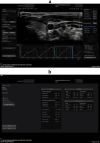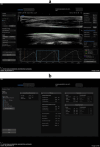Assessment of Carotid Stiffness and Strain Parameters Using Speckle Tracking Strain Ultrasonography in Rheumatoid Arthritis Patients
- PMID: 40351696
- PMCID: PMC12059733
- DOI: 10.31083/RCM27092
Assessment of Carotid Stiffness and Strain Parameters Using Speckle Tracking Strain Ultrasonography in Rheumatoid Arthritis Patients
Abstract
Background: Rheumatoid arthritis (RA) is a chronic, systemic autoimmune disease characterized by progressive joint deformity and increased mortality. RA patients typically exhibit elevated plasma levels of inflammatory markers, contributing to endothelial dysfunction and increased arterial wall stiffness-a recognized marker of subclinical atherosclerosis and heightened cardiovascular risk. This study aimed to evaluate carotid arterial wall stiffness in RA patients using ultrasound (US) imaging modality with speckle tracking carotid strain (STCS) software, a non-invasive method for assessing subclinical cardiovascular disease indicators.
Methods: This analytical case-control study was conducted at Aydin Adnan Menderes University Hospital Department of Radiology and Department of Rheumatology. Patients who met the inclusion criteria were enrolled in the study. Data collection tools included an 11-item case report form developed by the researcher based on relevant literature and carotid US examinations performed.
Results: The study included 143 participants: 75 RA patients (60 female and 15 male) and 68 control subjects (54 female and 14 male). The mean age was 50.9 ± 11.4 years (range: 25.0-74.0) for the RA group and 53.1 ± 12.6 years (range: 20.0-77.0) for the control group. Systolic blood pressure (SBP) and C-reactive protein (CRP) levels (mean ± SD) were 7.4 ± 11.5 in the RA group and 8.6 ± 22.2 in the control group. However, due to a few outliers in the control group, the median CRP was 3.3 mg/L (range: 2.0-71.9) in the RA group versus 2.0 mg/L (range: 0.8-145.0) in the controls. This nonparametric comparison showed significantly higher typical CRP levels in the RA group (p < 0.05). All stiffness and strain parameters in axial and longitudinal planes showed statistically significant differences between the two groups (p < 0.05), except the circumferential strain parameter "displacement (DP)" (p = 0.074). Although no significant correlation was found between the disease activity score (DAS) and any strain or stiffness parameter, the carotid intima-media thickness (CIMT) exhibited a significant positive correlation with disease duration (p = 0.001). After adjusting for confounding factors (age, gender, body mass index (BMI), and smoking status) using multivariate linear regression analysis, RA remained a significant predictor for all stiffness and strain parameters, except for the circumferential strain parameter DP.
Conclusion: Applying functional parameters to assess arterial wall stiffness and tension levels provides valuable insights for early detection of cardiovascular disease risk, preceding classical US findings such as increased intima-media thickness (IMT) and plaque formation. While preliminary, our findings from STCS measurements in RA patients show promise in evaluating cardiovascular disease risk in this population and potentially improving long-term outcomes through timely interventions.
Keywords: arterial wall stiffness; arterial wall strain; cardiovascular disease; carotid intima-media thickness; rheumatoid arthritis; speckle tracking carotid strain; ultrasonography.
Copyright: © 2025 The Author(s). Published by IMR Press.
Conflict of interest statement
The authors declare no conflict of interest.
Figures


References
-
- Larsson M, Heyde B, Kremer F, Brodin LÅ, D’hooge J. Ultrasound speckle tracking for radial, longitudinal and circumferential strain estimation of the carotid artery-an in vitro validation via sonomicrometry using clinical and high-frequency ultrasound. Ultrasonics . 2015;56:399–408. doi: 10.1016/j.ultras.2014.09.005. - DOI - PubMed
-
- Sutton-Tyrrell K, Najjar SS, Boudreau RM, Venkitachalam L, Kupelian V, Simonsick EM, et al. Elevated aortic pulse wave velocity, a marker of arterial stiffness, predicts cardiovascular events in well-functioning older adults. Circulation . 2005;111:3384–3390. doi: 10.1161/CIRCULATIONAHA.104.483628. - DOI - PubMed
LinkOut - more resources
Full Text Sources
Research Materials
Miscellaneous

